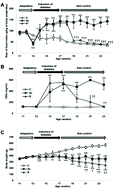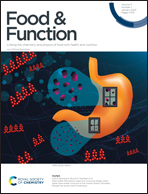Diet control to achieve euglycaemia induces tau hyperphosphorylation via AMPK activation in the hippocampus of diabetic rats†
Abstract
Alzheimer's disease (AD) is a chronic neurodegenerative disease, and typical pathologic findings include abnormally hyperphosphorylated tau aggregation and neurofibrillary tangles. Insulin resistance and hyperglycaemia have been proposed as risk factors for AD development. As the maintenance of optimal blood glucose level is an important indicator of diabetes mellitus (DM) treatment, diet control is essential. AMPK is a crucial sensor of cellular bioenergetics for controlling anabolic and catabolic metabolism. Since AMPK is a direct regulator of tau phosphorylation, we hypothesized that strict diet control to achieve euglycaemia affects tau protein phosphorylation through increased AMPK activity in the hippocampus of DM rats. To test this hypothesis, we generated insulin-deficient DM rats by subtotal pancreatectomy and the animals were categorized into the diet-restriction (R) group and ad libitum (AL) feeding group. We found that tau phosphorylation was significantly higher in the R group than that in the sham-control (C) or AL group. AMPK activity in the R group was significantly higher than that in the C or AL group, as expected. Furthermore, the R group showed more critical tau pathology in the hippocampus than the other groups. These results suggest that diet control to achieve euglycaemia in an insulin-deficient DM condition may be harmful because of the greater possibility of AD development through increased tau phosphorylation by AMPK activation in the hippocampus.



 Please wait while we load your content...
Please wait while we load your content...